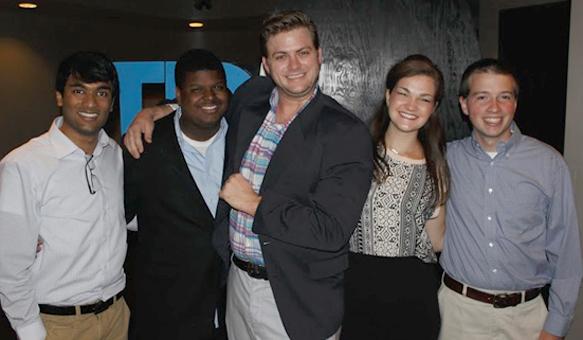Brazelton, the first speaker of the evening Friday night, gave his talk on how students can be “change agents” in the fight against education inequity. He underlined his own past as a student who was hit at birth with “the trio: being low-income, black and male,” but he said he overcame his circumstances with the help of teachers who pushed him to work hard.
‘’I am where I am because I was forced to pivot,” Brazelton said.
At the end of his talk, Brazelton tasked students in the audience to “be that pivot” in the lives of other students in need.
“Go forth and seek justice in all that you do,” he said in conclusion.
Following Brazelton was Bryan Anderson, a student majoring in aerospace engineering and computer science, who spoke on being an optimist in today’s world.
Anderson specifically highlighted Bill Gates and his enduring optimism in society today. He said it has given him the ability to work toward making a sustainable difference in different areas of the world. Anderson pointed out while the media may paint an upsetting picture of the world, rates of violent crime and poverty in the U.S. are decreasing.
“If we all work on things we are passionate about, we really can make a difference,” Anderson said.
Dabney Powell, a student majoring in food and nutrition and the director of Homegrown Alabama, discussed the relationship between a community and its food. Powell said although it may seem new, the idea of eating local is not. A hundred years ago, eating local was all there was, she said. The benefits of eating local include knowing where your food comes from and how it was grown.
“You can’t ask [supermarket managers] about how their food was grown,” Powell said.
Powell said she wanted to challenge students to be mindful of what they eat.
“Your best source is the farmer,” she said.
Koushik Kasanagottu, a UA graduate and current medical student at the University of Alabama at Birmingham, was the last speaker of the evening. Born in India and raised in Birmingham, Kasanagottu said he comes from a family where diabetes is common. Growing up in Alabama, a state which ranks third in the nation for diabetes prevalence, sparked Kasanagottu’s interest in the disease and other chronic illnesses that affect low-income communities. Kasanagottu said there are many things that affect a person’s ability to prevent diseases such as diabetes, one being education.
“If you don’t know what’s healthy or unhealthy, you can’t determine healthy foods to eat,” he said.
To help combat this, Kasanagottu created a student-run diabetics education program that reaches out to communities surrounding Tuscaloosa. The program informs members of the community who are at risk for diabetes how to live a healthy lifestyle within their means.
Musical guests performed between each speaker. Kristina Cruz performed a flow art dance, Mary Ann Cooper sang a cover of “Stay with Me,” and Max Dolensky, a technical musician, performed a song created with a Gameboy.
Tide Talks’ ninth speaker series event will be held in November. Nominations for speakers and performers can be made online.









